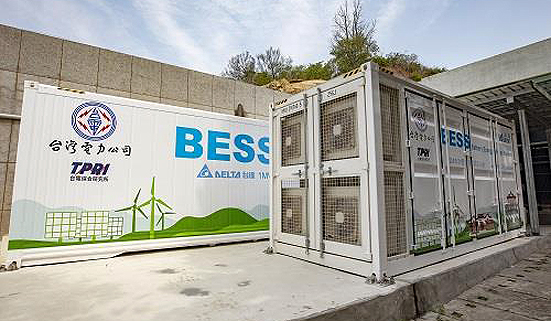Delta builds Taipower’s largest energy storage system
- June 2, 2020
- Steve Rogerson

Taiwan Power (Taipower) worked with local company Delta Electronics to build its largest energy storage system as part of a smart grid project at the Xia Xing power station on Kinmen Island.
Delta provided energy storage including a 1MWh lithium-ion battery energy storage system (BESS), a 2MW capacity power conditioning system (PCS), energy management system (EMS) and environment management systems.
The total was designed, manufactured and built by Delta, which specialises in one-stop integrated services. This is Taipower’s largest energy storage system.
It can help stabilise the grid by quickly supplying backup power within 200ms after an unplanned generator outage takes place, provide a 30-minute buffer time to the power plant, and regulate the fluctuations caused by renewable energy on the grid.
“Delta has actively invested in the smart grid field in recent years,” said Ping-Li Chung, president of Taipower. “It built an energy storage system as an experimental site for us at the Shulin branch of the Taiwan Power Research Institute in 2017. Energy storage systems play an important role in Taipower’s plans for building Kinmen into a smart grid demonstration island. We expect this 2MW, 1MWh energy storage system will fully demonstrate its capabilities for helping to stabilise the grid.”
Kinmen is Taiwan’s first island to demonstrate a smart grid power system. The experience of this system will guide the construction of smart grids on Taiwan’s main island in the future.
“It’s an honour to participate in establishing Taipower’s largest energy storage system for the smart grid demonstration island Kinmen,” said Ping Cheng, CEO of Delta. “Energy systems for the utility segment require rigorous planning and solid technology. Under the expert guidance of Taipower, Delta was able to leverage its strengths to make a contribution to Taiwan’s energy transformation. Energy transformation is a crucial issue for the development of smart cities. In addition to energy infrastructure such as renewable energy, energy storage systems, energy IoT and EV charging, Delta is also devoted to developing building automation, which manages power consumption information and energy-saving applications from end consumers.”
For the Kinmen Island project, Delta integrated its building automation, energy infrastructure and industrial products, and energy storage to complete this 2MW, 1MWh energy storage system, which is the largest energy storage system of Taipower. The high-power lithium-ion batteries used in the BESS were made at Delta’s plant in Taiwan, and provide two to four times the discharge power over capacity to supply a large amount of power instantly.
Integrated with a megawatt-level bi-directional PCS and a self-developed EMS, the system can be operated in dual mode. Ordinarily, it runs in the F-P (frequency-watt) mode to help regulate frequency, but when any emergency occurs, it will automatically switch to the RoCoF (rate of change of frequency) mode and within 200ms it will supply 2MW of power to secure a 30-minute buffer time for the grid. This rapid response time is twice as fast as the 400ms required by Taipower.
In addition to automatic voltage and frequency regulation, this system also features functions such as real and reactive power compensation and virtual synchronous generator (VSG) control.
Since it was put into operation in January, the system has successfully helped stabilise the grid during the trial run of new generator sets numbers nine and ten at the Tashan power plant, absorbing the excess reactive power generated after Kinmen’s cables went underground, and maintaining the stability of the system’s voltage. Moreover, to optimise the environment equipment operation of the system container, Delta introduced its IoT building automation to monitor and control air conditioning, lighting, fire protection and water accumulation detection equipment on a centralised management platform.
The building automation also included setting up smart LED street lights with IP cameras in the surroundings. If any abnormal intrusions are detected on site, the system immediately notifies power plant management personnel to respond.
The instantaneous loads of traditional generators and the difficulty of controlling renewable energy may cause large frequency fluctuations on the grid, which can challenge the stability of the power supply. Considering the large load variability and the rapid increase in the proportion of renewable energy in recent years in Kinmen, it is particularly important to build an energy storage system that can adjust the frequency in ordinary times and respond quickly in emergencies.
Delta has completed energy storage systems for dozens of sites globally, including factories, energy-saving parks, microgrids, solar power plants, EV charging stations and commercial buildings. The firm’s energy storage systems can optimise grid efficiency and coordinate the energy supply.




